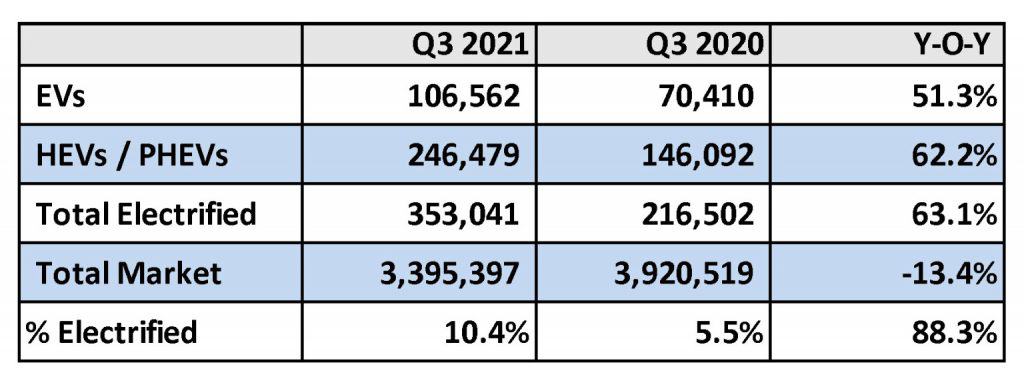
During the third quarter of this year, electrified vehicle sales hit a record high, accounting for 10.4% of total vehicle sales. That is nearly double the volume of one year ago when electrified vehicle sales comprised only 5.5% of total sales in Q3 2020. In addition, consumers appear to be nearly equally as interested in EVs as they are hybrids. When examining the data by specific electrified vehicle category, sales of hybrids and plug-in hybrids increased 62.2% in Q3 2021, while sales of EVs increased 51.3%.
“The exponential growth of electrified vehicle sales in the U.S. is a combined result of more product availability and wider consumer acceptance,” said Matt DeLorenzo, senior managing editor for Kelley Blue Book. “We are seeing the investments in this technology beginning to pay off with greater growth in EV volume. This pace will continue to increase as consumers find more choices in both pure electric and plug-in hybrid vehicles. Even as the auto industry faces challenges in chip shortages, limited production and inventories, and higher prices, the growing demand for electric vehicles is a significant development.”
Together, Tesla and Toyota remain firmly planted in the driver’s seat when it comes to electrified vehicles. Toyota has long dominated the hybrid powertrain market, paving the way for unquestionable leadership today. Through the first nine months of the year, more than 24% of combined Toyota and Lexus sales were hybrid vehicles. In addition, more than 60% of all hybrid-electric vehicles sold industry-wide in Q3 hailed from Toyota Motor Company, a position nearly as dominant as Tesla.
On the EV front, Tesla continues to lead with the Model 3 and Model Y as dominant players. In total, Tesla’s total share of the EV market jumped back above 70% in Q3 after falling to 64% in Q2. The Tesla Model Y holds the title of the industry’s best-selling EV, accounting for nearly 40% of total EV sales. However, new players from other auto manufacturers, including the Ford Mustang Mach-E and Volkswagen ID.4, continue to enjoy early success and should not be overlooked.